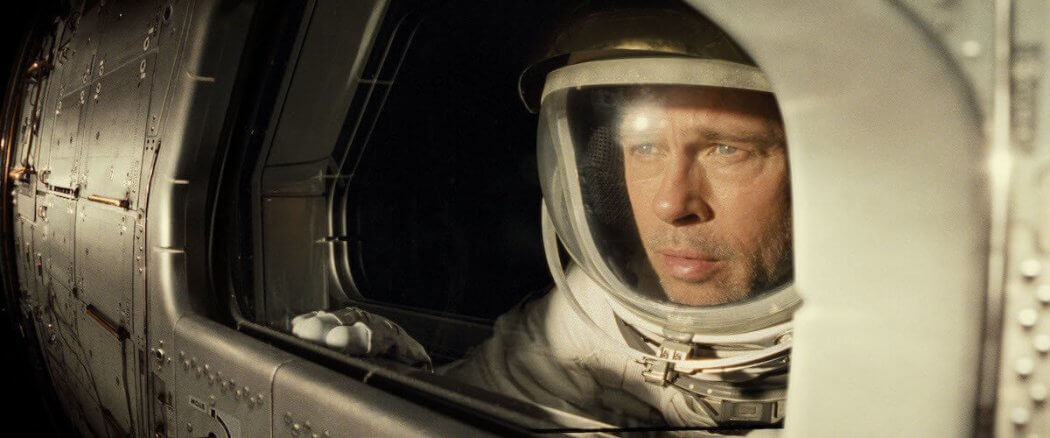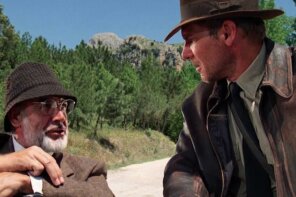I entered the film Ad Astra (or “to the stars”) not really knowing what to expect other than it was another Brad Pitt vehicle. Almost coincident to his star turn with great reviews in Tarantino’s Once Upon a Time In Hollywood, Pitt is also featured in this film. Would it be a cheap knock-off science fiction such as De Palma’s Mission to Mars or 2011’s Apollo 18, nearly indecipherable as in Soderbergh’s Solaris, or mind-bending as in Kubrick’s 2001: A Space Odyssey — still in my personal top three films of all time?
The Near Future
Taking place after Mars is colonized, the moon has become a tourist destination and at least one space mission has ambitiously been launched to the edge of our solar system. The film opens with Pitt working on an edge-of-the-earth’s-atmsophere space station when some type of electronic storm hits the immense crane-like structure causing multiple explosions and structural failures. Pitt, who is luckily working on the exterior of the structure in his space suit, is thrown off the station and undertakes a breath-taking (and in reality impossible?) free-fall to the earth which, of course as the star of the film, he survives. Still, the near-catastrophe makes one’s heart pound and is alone almost worth the cost of admission. It is reminiscent of the final scenes (unbelievable per scientists) in Cuarón’s Gravity.
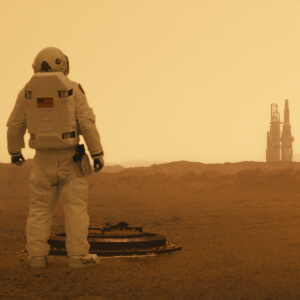 Back on earth Pitt’s character Roy McBride is apparently very quickly recruited to stop the mysterious power “surges” which are devastating planet earth and which appear to be emanating from the rings of Neptune. McBride is chosen to intervene because of the top-secret knowledge obtained by the U.S. Space Command that the source of the surges is an anti-matter generator on a deep-space mission called the Lima Project from which communication ceased 16 years into the mission. It has not been heard for many years and the world was told it was “lost.” The purpose of the Lima Project was to find extraterrestrial life or intelligence beyond our universe. The tie-in to McBride was that the commander of the Lima Project was Roy’s father, famed astronaut H. Clifford McBride. Upon learning, for the first time, that his father may actually still be living, the younger McBride is joined by an old associate of his father Colonel Pruitt, played by the always memorable Donald Sutherland (84 years old and counting). Pruitt says that he knew Roy’s father well, having attended Purdue with him in their younger days.*
Back on earth Pitt’s character Roy McBride is apparently very quickly recruited to stop the mysterious power “surges” which are devastating planet earth and which appear to be emanating from the rings of Neptune. McBride is chosen to intervene because of the top-secret knowledge obtained by the U.S. Space Command that the source of the surges is an anti-matter generator on a deep-space mission called the Lima Project from which communication ceased 16 years into the mission. It has not been heard for many years and the world was told it was “lost.” The purpose of the Lima Project was to find extraterrestrial life or intelligence beyond our universe. The tie-in to McBride was that the commander of the Lima Project was Roy’s father, famed astronaut H. Clifford McBride. Upon learning, for the first time, that his father may actually still be living, the younger McBride is joined by an old associate of his father Colonel Pruitt, played by the always memorable Donald Sutherland (84 years old and counting). Pruitt says that he knew Roy’s father well, having attended Purdue with him in their younger days.*
Into the Void
The narrative quickly progresses with little character development as McBride and Pruitt take a commercial flight to the moon (rekindling memories of that same flight from 2001: A Space Odyssey — which this film mimics in several aspects). There is another extended, thrilling CGI episode where the protagonists are in lunar rovers (which look pretty much indistinguishable from those used in the moon landings of 40-50 years ago other than for their NASCAR-like speed). In the chase, Roy and Pruitt narrowly escape death in a video-game like chase by “space pirates” and end up at a secret Space Command base on the dark side of the moon. Apparently the stress of the chase is too much for Pruitt who expires.
Roy travels on to Mars interrupted by a diversion to a stranded spaceship asking for help. This is the “horror” interlude of Ad Astra, which again features a tense escape from a nearly fatal outcome. Upon finally arriving on Mars, Roy finds his attempts to communicate with the Lima Project and his father via “laser” from the base are not fruitful, even when Roy disobeys his commands and personalizes his message to the Lima ship saying that he just wants to see his “dad.” McBride then finds out via a leak of information that there is at that very minute a secret mission being launched to go to the Lima project and destroy the anti-matter generator. He stows away on that ship just as it launches from Mars setting up the film’s third act.
A Beautiful and Earnest Film
Ad Astra’s CGI is impressive, as is the art direction. There are scenes very reminiscent of, once again, 2001: A Space Odyssey with bright red, turquoise, orange, and yellow hallways and rooms under the harsh glare of artificial lighting. Comfort rooms allow travelers to be immersed in scenes with flora and fauna, hearing the relaxing sounds of nature. Almost all of the scenes on the moon, Mars, and in outer space are imaginative and like eye-candy. And the music, much of it captivating electronica but at times reverting to the classical (such as Beethoven’s “Moonlight” sonata which is oddly fitting when used), sets the mood. James Gray (The Lost City of Z) directed and wrote much of the screenplay for Ad Astra. He is masterful in setting the mood of this film, but the film is schizophrenic in its yo-yoing between mood and action scenes. In the quiet scenes, Brad Pitt gives that mood just the right nuance. Pitt’s quiet, nearly mute, acting where much is told by his eyes or the furrows of his brow, is impressive. As emotionally controlled as Roy is, his character is believable and fits the prototype for how many of our astronauts present themselves. This is one more film in Pitt’s resume that elevates him as one of our most arresting actors.
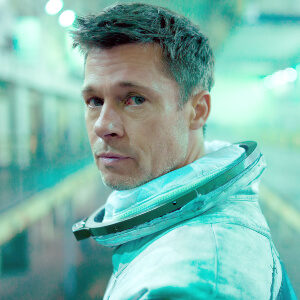 Roy is required (along with, one assumes, all space travelers) to be monitored by computer for his psychological stability. He gives a report in which he states, seemingly by rote memory, that “I’m steady, I am calm. I slept well, no bad dreams. I am active and engaged. I’m aware of my surroundings and those in my immediate sphere. I’m attentive. I am focused on the essentials, to the exclusion of all else…” and on and on — one bland statement after another. The computer monitors his physiological state as he is making this “report” via a probe… like attaching yourself to a lie-detector. Apparently this type of response is what his mentors desire as he always passes — with one exception.
Roy is required (along with, one assumes, all space travelers) to be monitored by computer for his psychological stability. He gives a report in which he states, seemingly by rote memory, that “I’m steady, I am calm. I slept well, no bad dreams. I am active and engaged. I’m aware of my surroundings and those in my immediate sphere. I’m attentive. I am focused on the essentials, to the exclusion of all else…” and on and on — one bland statement after another. The computer monitors his physiological state as he is making this “report” via a probe… like attaching yourself to a lie-detector. Apparently this type of response is what his mentors desire as he always passes — with one exception.
Roy’s emotionless reporting to his computerized evaluator sets the tone for the non-action scenes in the entire film. Roy has (or had?) a spouse and there are scattered scenes of Roy and his wife Eve (played by Liv Tyler — but don’t blink or you will miss her appearances). Roy’s feelings for her seem lukewarm at best, with the definite impression that Eve has rejected such a remote relationship. His desire for human relationships seems only to extend to his father-who-was-rarely-present in his life. Roy must affirm the maxim by which he lived his life: “I do what I do because of my dad.” But what happens when this principle for the meaning of his life is threatened?
What Is Out There?
Tommie Lee Jones plays his father, and Commander McBride’s many years in deep space have not been kind to him. Jones, in another of his eccentric movie characters, is hard to decipher. He appears to have gone blind and his actions and speech are no longer rational to those looking for earth-bound explanations. Roy begins to realize the idolization of his father, which has guided his entire life, may in fact be a false cornerstone.
There does appear to be a place for faith in this film. Prayers are said. A funeral is reverent for a life passed. The Milky Way and beyond, with the planets each orbiting “in place” is, at times, viewed with awestruck wonder. But no answers, or consolations for one’s fears, or attempts to accept the mystery of life by means of appreciating its creator is ever made concrete. Roy’s voice-over is present throughout (for those of you who hate that device, it may be a difficult watch). It did not bother me, but what did bother me was that not once did he raise the possibility that some greater intelligence held the answers to all these natural wonders.
The supposedly climactic revelation between the younger and older McBride was a let-down. I had questions that begged for answers: Is his father trying to destroy earth? Is he purposefully hiding from the world, and his son? Why did he turn his back on his family and his world? And, most importantly, did he find the answers about God and/or alien life for which he was looking? In addition, Ad Astra is trying to say something deep, or at least wise, about father-son relationships but in the end there is little to learn that makes a whole lot of sense. The father/son confrontation ends with vague platitudes such as “The world awaits our discovery, my son.” or “We need to find what science tells us is impossible. I can’t have failed.” to which Roy replies “Dad, you haven’t. Now we know. We’re all we’ve got.” Really? You get to Neptune and then decide there are no answers? I felt like humming the great Peggy Lee song “Is that all there is… Is that all there is my friend?” For wisdom, I much prefer Pruitt’s warning that “The enemy up here is not a person or a thing… it’s the endless void.” Or the psalmist’s poetic:
“I look up at your macro-skies, dark and enormous,
your handmade sky-jewelry,
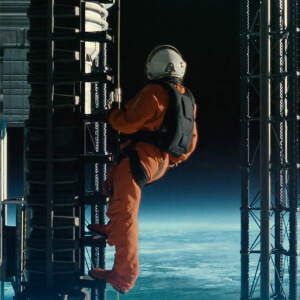 Moon and stars mounted in their settings.
Moon and stars mounted in their settings.
Then I look at my micro-self and wonder,
Why do you bother with us?
Why take a second look our way?
Yet we’ve so narrowly missed being gods,
bright with Eden’s dawn light.
You put us in charge of your handcrafted world…
God, brilliant Lord,
your name echoes around the world.” — Psalm 8 (in part), The Message
Now that is something to ponder.
In the End…
Still, some of Ad Astra’s scenes are so ethereal and elegant, and some were so thrilling, that I cannot dislike this movie despite it being filled with physical illogic. Roy’s journey to Neptune takes three months… are we to believe this? A signal traveling at the speed of light takes over 4 hours, and a spaceship using the fastest technology known would take around 10 years — depending on where Neptune is in its orbit. The physics of the final action scenes in Neptune’s rings is laughable — I tried real hard to not let it ruin the film for me as, despite its lack of believability, the sequences were jaw-dropping. I know, “suspension of disbelief.”
So see it for the amazing CGI and the beauty with which it paints our universe. It is an amazing thrill ride. See it for Brad Pitt’s standout performance. See it for the stark beauty of the planets and the amazing visions of the universe. See it for the thoughtful mood that pervades much of the rest of the film. But do not expect too much of the plot in terms of revelations and wisdom as you will surely be disappointed.
__________________________________________
*I mention this only because as a Purdue alumnus I was offended that last year’s First Man, the story of Purdue University graduate, first-man-on-the-moon Neil Armstrong, did not once mention “the cradle of astronauts.”

